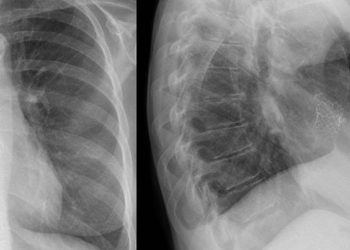Using the C2HEST score to identify at‐risk patients for sustained atrial high‐rate episodes
1. The C2HEST score had moderate accuracy in predicting sustained atrial high-rate episodes (SAHREs) for patients with cardiac implantable electronic devices, but no atrial fibrillation.
2. A 1-point increase in the C2HEST score was associated with a 39% increased risk of SAHREs).
Evidence Rating Level: 2 (Good)
In patients without atrial fibrillation (AF) but having cardiac implantable electronic devices (CIEDs), there is an estimated 30% prevalence for experiencing atrial high-rate episodes (AHREs). In particular, when these episodes last greater than 24 hours, they are classified as sustained AHREs (SASHREs), a form of subclinical AF, which are associated with greater risk of thromboembolic events. However, there has not been a model to assess risk of these events in CIED patients without AF, and so the study aimed to examine the predictive value of a recently developed evaluation tool, known as the C2HEST. This stands for coronary artery disease or chronic obstructive pulmonary disease, hypertension, elderly age (≥75 years), systolic heart failure, and thyroid disease. The E and S are worth 2 points each, whereas the other letters are worth 1 point. The data set for this study came from the West Birmingham Atrial Fibrillation Project, with patients from 1999 to 2017. Among the 500 patient sample, the mean age was 69.9 years, and 57.0% were male. Over a mean follow-up of 53.1 months, 44 patients experienced SAHREs, with an incident rate of 2.09% per year (95% CI, 1.47-2.71% per year). The patients with SAHREs had a mean±SD C2HEST score of 3.4±1.5, versus a score of 2.4±1.6 in those without SAHREs (p < 0.001). For those with a score of 0 or 1, 2 or 3, and greater than 4, the incident rates were 0.85 (95% CI 0.27-1.94), 1.87. (95% CI 1.06-2.91), and 3.62 (95% CI 2.14-5.16) respectively. With the 0 or 1 score as the reference, the p-values were 0.159 for the 2-3 score and 0.004 for the greater than 4 score. Furthermore, there was a 39% higher risk of SAHREs with every point increase on the C2HEST criteria (hazards ratio 1.39, 95% CI 1.16-1.68). Overall, the C2HEST evaluation tool was determined to have a moderately accurate predictive value for SAHREs in CIED patients with no AF. In particular, patients with a C2HEST score of greater than 4 are at particularly high risk, which has implications for more frequent monitoring and device examination for this population.
Click to read the study in JAHA
Image: PD
©2021 2 Minute Medicine, Inc. All rights reserved. No works may be reproduced without expressed written consent from 2 Minute Medicine, Inc. Inquire about licensing here. No article should be construed as medical advice and is not intended as such by the authors or by 2 Minute Medicine, Inc.







